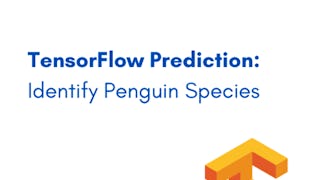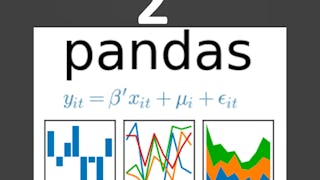- Browse
- Numpy
NumPy Courses
NumPy courrses often teach array manipulation, mathematical functions, and data analysis techniques. You can build skills in performing complex calculations, handling large datasets, and optimizing performance for numerical operations. Many courses introduce tools like Jupyter Notebooks and Python libraries, showing how these skills are applied in data science, machine learning, and artificial intelligence projects.
Popular NumPy Courses and Certifications

Skills you'll gain: Matplotlib, Applied Machine Learning, Random Forest Algorithm, Predictive Modeling, Data Visualization, Data Preprocessing, Machine Learning, Data Manipulation, Feature Engineering, Data Cleansing, Python Programming, Data Science, Model Evaluation, Classification Algorithms, NumPy, Pandas (Python Package)
Beginner · Course · 1 - 3 Months
 Status: FreeFree
Status: FreeFreeSkills you'll gain: Model Evaluation, Data Preprocessing, Tensorflow, Applied Machine Learning, Feature Engineering, Data Cleansing, Classification And Regression Tree (CART), Machine Learning, Random Forest Algorithm, Pandas (Python Package), Data Analysis, Exploratory Data Analysis
Intermediate · Guided Project · Less Than 2 Hours
 Status: Free TrialFree TrialH
Status: Free TrialFree TrialHHoward University
Skills you'll gain: Linear Algebra, Data Visualization, Applied Mathematics, NumPy, Jupyter, Mathematical Modeling, Data Science, Python Programming, Software Installation, Data Manipulation, Git (Version Control System)
4.3·Rating, 4.3 out of 5 stars15 reviewsBeginner · Course · 1 - 4 Weeks

Skills you'll gain: Pandas (Python Package), Data Analysis, Data Manipulation, Data Wrangling, NumPy, Python Programming
4.8·Rating, 4.8 out of 5 stars29 reviewsBeginner · Guided Project · Less Than 2 Hours
 Status: Free TrialFree TrialE
Status: Free TrialFree TrialEEdureka
Skills you'll gain: Power BI, Data Visualization, Data Analysis Expressions (DAX), Matplotlib, Plotly, Data Analysis, Exploratory Data Analysis, Seaborn, SQL, Pandas (Python Package), Probability & Statistics, Regression Analysis, Machine Learning, Statistical Hypothesis Testing, Python Programming, Data Transformation, Feature Engineering, Data Integration, NumPy, Web Scraping
4.2·Rating, 4.2 out of 5 stars22 reviewsIntermediate · Specialization · 3 - 6 Months
 Status: PreviewPreviewI
Status: PreviewPreviewIInstitut Mines-Télécom
Skills you'll gain: Image Analysis, Computer Vision, Image Quality, Data Processing, Digital Signal Processing, Data Analysis, Computer Programming, Medical Imaging, Python Programming, Histogram, Algorithms
Intermediate · Course · 1 - 3 Months
 Status: NewNewStatus: Free TrialFree Trial
Status: NewNewStatus: Free TrialFree TrialSkills you'll gain: Data Preprocessing, Scalability, Data Manipulation, Pandas (Python Package), Applied Machine Learning, Machine Learning Methods, Predictive Modeling, Python Programming, Machine Learning Algorithms, NumPy, Model Evaluation, Exploratory Data Analysis
4.6·Rating, 4.6 out of 5 stars25 reviewsIntermediate · Course · 1 - 4 Weeks
 Status: Free TrialFree Trial
Status: Free TrialFree TrialSkills you'll gain: File I/O, Matplotlib, Data Manipulation, Pandas (Python Package), Data Visualization, Data Persistence, NumPy, Data Processing, Scripting, Object Oriented Programming (OOP), Python Programming, Query Languages, Database Application, Databases, Relational Databases, Object Oriented Design, Data Import/Export, Debugging
4.4·Rating, 4.4 out of 5 stars21 reviewsBeginner · Course · 1 - 4 Weeks
 Status: NewNewStatus: Free TrialFree Trial
Status: NewNewStatus: Free TrialFree TrialSkills you'll gain: Matplotlib, Data Preprocessing, Regression Analysis, Scikit Learn (Machine Learning Library), Data Visualization, Python Programming, Applied Machine Learning, Pandas (Python Package), Model Evaluation, NumPy, Predictive Modeling, Machine Learning Algorithms, Machine Learning, Data Manipulation, Dimensionality Reduction, Statistical Methods, Data Transformation, Feature Engineering, Unsupervised Learning, Performance Tuning
Mixed · Course · 1 - 4 Weeks
 Status: PreviewPreviewI
Status: PreviewPreviewIInstitut Mines-Télécom
Skills you'll gain: Image Analysis, Digital Signal Processing, Computer Vision, NumPy, Numerical Analysis, Python Programming, Applied Mathematics
Intermediate · Course · 1 - 4 Weeks

Skills you'll gain: PyTorch (Machine Learning Library), Computer Vision, NumPy, Matplotlib, Convolutional Neural Networks, Deep Learning, Pandas (Python Package), Image Analysis, Python Programming, Artificial Neural Networks, Data Manipulation
Intermediate · Course · 1 - 3 Months

Skills you'll gain: Deep Learning, Tensorflow, Keras (Neural Network Library), Matplotlib, NumPy, Artificial Neural Networks, Python Programming, Pandas (Python Package), Data Science, Artificial Intelligence, Data Preprocessing, Machine Learning, Data Manipulation, Model Evaluation, Classification Algorithms
Beginner · Course · 3 - 6 Months
In summary, here are 10 of our most popular numpy courses
- Machine Learning: Random Forest with Python from Scratch©: Packt
- TensorFlow Prediction: Identify Penguin Species: Coursera
- Introduction to Linear Algebra and Python: Howard University
- Mastering Data Analysis with Pandas: Learning Path Part 2: Coursera
- Applied Data Analytics: Edureka
- Traitement d'images : segmentation et caractérisation: Institut Mines-Télécom
- Project on Recommendation Engine - Advanced Book Recommender: EDUCBA
- Python Scripting: Files, Inheritance, and Databases: LearnQuest
- Machine Learning with Python: Build & Optimize: EDUCBA
- Traitement d'images : analyse fréquentielle et multi-échelle: Institut Mines-Télécom










